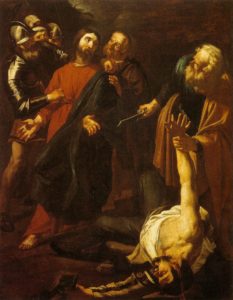Thoughts on Sunday’s Lessons for Aug. 18, 2019
First Reading (Track One): Isaiah 5:1-7
Sunday’s gospel shows us an unexpected side of Jesus. Continuing his conversation with the disciples that we heard last week, he declares a stern and seemingly angry desire to bring fire to the earth, not ushering in peace but division that will even separate family members from each other.

When Jesus ordered Peter to put away his sword: The Capture of Christ with the servant Malchus (1616-1617), oil painting on canvas by Dirck van Baburen (c.1594-1624). Fondazione Roberto Longhi art institute, Florence, Italy. (Click image to enlarge.)
Sunday’s readings provide us background for this confusing passage. Isaiah frames our Track One first reading as a love song to God’s beautiful vineyard, but this lovely image goes downhill fast. Although it was thoughtfully planted and carefully tended, the vineyard produced sour, unusable grapes. God is outdone with it and will tend it no more. Then Isaiah names names: The vineyard is the house of Israel, the people of Judah. God planted them to reap righteousness and justice, but they’ve failed in this mission, and their harvest will be destruction and exile.
First Reading (Track Two): Jeremiah 23:23-29
Sunday’s Track Two first reading reminds us of the idea of panentheism (not pantheism) as described by the late theologian Marcus Borg: God is transcendent, wholly other, distinct from the world, but God is also immanent, right here, all around us and present in our lives. The Prophet Jeremiah, who spoke words of doom and warning before Israel’s destruction and exile, finds God in both places. Don’t think that God is only far off, Jeremiah warns: God is nearby, too. In words that Christians might see as foreshadowing Jesus’s words in today’s gospel, the prophet warns that God holds fire and destructive power ready at hand for those who forget God’s word.
Psalm: (Track One): Psalm 80:1-2, 8-18
In the Psalmist’s song we can hear echoes of Isaiah’s lyrics about God’s lost love for Israel. Here, too, we sing of Israel as God’s beloved, well-tended vine, one that grew fruitful and mighty. But that was then, and now it is ravaged, eaten by forest animals, burned and cut down. The Psalmist calls on God: Please return and tend this vine! Return life to the exiled people, the Psalmist pleads, and they surely won’t betray you again.
Psalm (Track Two): Psalm 82
The idea of God sitting in a divine council of other gods sounds strange to modern ears accustomed to the idea of monotheism. Bible historians think that this concept may be an echo of ancient Near Eastern tradition, when early Israelites understood our God as supreme over the lesser gods of enemy nations. In any event the theme of the Psalm is as relevant today as it was in the times of the ancient Temple: God insists on justice, and calls us to stand up for the weak, the orphan, the lowly, the humble and the needy.
Second Reading: Hebrews 11:29 – 12:2
Following the praise for our ancestor in faith, Abraham, in last Sunday’s reading, we now hear more vignettes about Old Testament heroes who achieved greatness through their faith and now form a cloud of witnesses that surrounds and inspires us. These witnesses, we hear, show us the way to “run with perseverance the race that is set before us” as we follow Jesus, who endured the shame of crucifixion and now sits at the right hand of God.
Gospel: Luke 12:49-56
This is one of the gospel passages that make us stop and think. Isn’t Jesus kind and caring – the Prince of Peace? Doesn’t Jesus love his enemies and tell us to do the same? He told us to turn the other cheek to those who would strike us! So what’s all this angry talk about not bringing peace but fire and division? (In fact, in Matthew’s Gospel, this story is told in even stronger language: “I have not come to bring peace, but a sword.”) What’s going on? Remember that we are following Jesus’ journey to Jerusalem and the cross. Walking this hard journey with Jesus is not an easy path. The Kingdom is coming soon, and working to bring it in may divide us even from friends and family.
What are “Track 1” and “Track 2”?
During the long green season after Pentecost, there are two tracks (or strands) each week for Old Testament readings. Within each track, there is a Psalm chosen to accompany the particular lesson.
The Revised Common Lectionary allows us to make use of either of these tracks, but once a track has been selected, it should be followed through to the end of the Pentecost season, rather than jumping back and forth between the two strands.
For more information from LectionaryPage.net, click here.
